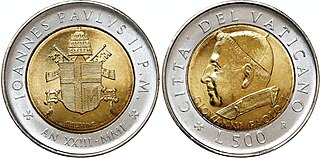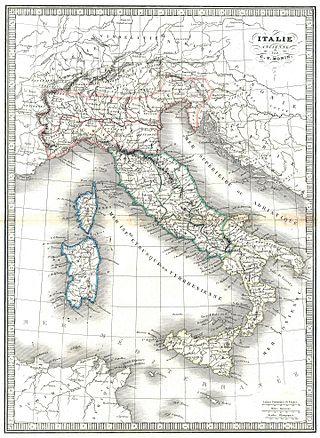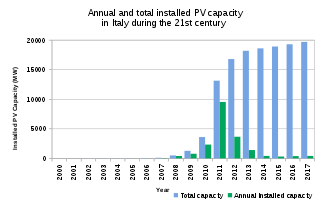
The Bank of Italy is the Italian member of the Eurosystem and has been the monetary authority for Italy from 1893 to 1998, issuing the Italian lira. Since 2014, it has also been Italy's national competent authority within European Banking Supervision. It is located in Palazzo Koch, via Nazionale, Rome.

The economy of Italy is a highly developed social market economy. It is the third-largest national economy in the European Union, the second-largest manufacturing industry in Europe, the 8th-largest economy in the world by nominal GDP, and the 12th-largest by GDP (PPP). Italy is a founding member of the European Union, the Eurozone, the OECD, the G7 and the G20; it is the eighth-largest exporter in the world, with $611 billion exported in 2021. Its closest trade ties are with the other countries of the European Union, with whom it conducts about 59% of its total trade. The largest trading partners, in order of market share in exports, are Germany (12.5%), France (10.3%), the United States (9%), Spain (5.2%), the United Kingdom (5.2%) and Switzerland (4.6%).

Turkey is a founding member of the OECD and G20. The country's economy ranked as the 17th-largest in the world and 7th-largest in Europe by nominal GDP in 2023. It also ranked as the 11th-largest in the world and 5th-largest in Europe by PPP in 2023. According to the IMF, as of 2022, Turkey had an upper-middle income, mixed-market, emerging economy. Turkey has often been defined as a newly industrialized country since the turn of the 21st century. The country is the fourth most visited destination in the world, and has over 1,500 R&D centres established both by multinational and national firms. Turkey is among the world's leading producers of agricultural products, textiles, motor vehicles, transportation equipment, construction materials, consumer electronics, and home appliances.
The organic composition of capital (OCC) is a concept created by Karl Marx in his theory of capitalism, which was simultaneously his critique of the political economy of his time. It is derived from his more basic concepts of 'value composition of capital' and 'technical composition of capital'. Marx defines the organic composition of capital as "the value-composition of capital, in so far as it is determined by its technical composition and mirrors the changes of the latter". The 'technical composition of capital' measures the relation between the elements of constant capital and variable capital. It is 'technical' because no valuation is here involved. In contrast, the 'value composition of capital' is the ratio between the value of the elements of constant capital involved in production and the value of the labor. Marx found that the special concept of 'organic composition of capital' was sometimes useful in analysis, since it assumes that the relative values of all the elements of capital are constant.

The lira was the currency of Italy between 1861 and 2002. It was introduced by the Napoleonic Kingdom of Italy in 1807 at par with the French franc, and was subsequently adopted by the different states that would eventually form the Kingdom of Italy in 1861. It was subdivided into 100 centesimi, which means "hundredths" or "cents". The lira was also the currency of the Albanian Kingdom from 1941 to 1943.

The economy of Fascist Italy refers to the economy in the Kingdom of Italy under Fascism between 1922 and 1943. Italy had emerged from World War I in a poor and weakened condition and, after the war, suffered inflation, massive debts and an extended depression. By 1920, the economy was in a massive convulsion, with mass unemployment, food shortages, strikes, etc. That conflagration of viewpoints can be exemplified by the so-called Biennio Rosso.
Historians and other scholars disagree on the question of whether a specifically fascist type of economic policy can be said to exist. David Baker argues that there is an identifiable economic system in fascism that is distinct from those advocated by other ideologies, comprising essential characteristics that fascist nations shared. Payne, Paxton, Sternhell et al. argue that while fascist economies share some similarities, there is no distinctive form of fascist economic organization. Gerald Feldman and Timothy Mason argue that fascism is distinguished by an absence of coherent economic ideology and an absence of serious economic thinking. They state that the decisions taken by fascist leaders cannot be explained within a logical economic framework.

The lira was the currency of the Vatican City between 1929 and 2002. It was not a separate currency but an issue of the Italian lira; the Banca d'Italia produced coins specifically for Vatican City.
The economic history of the Republic of Turkey had four eras or periods. The first era had the development policy emphasizing private accumulation between 1923 and 1929. The second era had the development policy emphasized state accumulation in a period of global crises between 1929 and 1945. The third era was state-guided industrialization based on import-substituting protectionism between 1950 and 1980. The final, era was the opening of the economy to liberal trade in goods, services and financial market transactions since 1981.

The Naval Defence Act 1889 was an Act of the Parliament of the United Kingdom. It received royal assent on 31 May 1889 and formally adopted the "two-power standard" and increased the United Kingdom's naval strength. The standard called for the Royal Navy to maintain a number of battleships at least equal to the combined strength of the next two largest navies in the world, which then were France and Russia. An extra £20 million over the following four years were provided for ten new battleships, thirty-eight new cruisers, eighteen new torpedo boats and four new fast gunboats. The two-power standard was maintained until disarmament began during the interwar period.

The Battle for Grain, also known as the Battle for Wheat, was a propaganda campaign launched in 1925 during the fascist regime of Italy by Benito Mussolini, with the aim of gaining self-sufficiency in wheat production and freeing Italy from the "slavery of foreign bread". This campaign was successful in increasing wheat output and lowering the trade balance deficit, but was ultimately economically counter-productive for Italy's agricultural sector as farmers who grew other produce had to clear their land for grain cultivation which decreased exports and thus resulted in higher food prices which placed Italian families under financial strain.
The Battle for the Lira was an economic policy undertaken by the Fascists in Italy during the 1920s as an attempt to raise the claims of Italy becoming a great power.
Strict sustainability standards for biofuel in the European Union (EU) are set by the European Commissioner on Energy. Biofuels are considered a renewable alternative to fossil fuels in the transportation sector for the EU. The EU has played a large role in increasing the use of biofuels in member states; however, it has also aimed, to some extent, to mitigate the potential negative impacts of biofuel production. Current EU legislation on biofuels includes a goal to increase renewable energy consumption by 20%, eliminate biofuel feedstock sourced from carbon-rich land, accounting for emissions caused from land use change as well as solely biofuel usage, and reducing greenhouse gas intensities from fuels used in transport and machinery.
The Battle for Land, started in 1928 in Italy by Benito Mussolini, aimed to clear marshland and make it suitable for farming, as well as reclaiming land and reducing health risks.
The Battle for Births was one of four economic battles that took place in Fascist Italy (1922–1943), the others being the Battle for Grain, the Battle for the Lira, and the Battle for Land. Prime Minister Benito Mussolini, often known as Il Duce, envisioned an Italian Empire to rival that of the Romans, and in order to carry out this objective, foresaw the need to increase the population. Mussolini pursued an often aggressive foreign policy to achieve his colonial aims: the Italian army invaded Abyssinia in October 1935. The phrase "Battle for Births" was also used, in contemporary sources, to describe policies developed in Nazi Germany.

Italy has a long history of different coinage types, which spans thousands of years. Italy has been influential at a coinage point of view: the medieval Florentine florin, one of the most used coinage types in European history and one of the most important coins in Western history, was struck in Florence in the 13th century, while the Venetian sequin, minted from 1284 to 1797, was the most prestigious gold coin in circulation in the commercial centers of the Mediterranean Sea.

This is a history of the economy of Italy. For more information on historical, cultural, demographic and sociological developments in Italy, see the chronological era articles in the template to the right. For more information on specific political and governmental regimes in Italy, see the Kingdom and Fascist regime articles.

Solar power is an important contributor to electricity generation in Italy, accounting for 8% of the total in 2017. As of 2022, the country has a total installed capacity of 22.56 GW. In 2019, Italy set a national goal of reaching 50 GW by 2030.

The Agricultural policy of fascism in Italy was a series of complex measures and laws designed and enforced during Italian Fascism, as a move towards attempted autarky, specifically by Benito Mussolini following the Battle for Grain and the 1935 invasion of Abyssinia and subsequent trade embargoes.
Economic democracy is a socioeconomic philosophy that proposes to shift ownership and decision-making power from corporate shareholders and corporate managers to a larger group of public stakeholders that includes workers, consumers, suppliers, communities and the broader public. No single definition or approach encompasses economic democracy, but most proponents claim that modern property relations externalize costs, subordinate the general well-being to private profit and deny the polity a democratic voice in economic policy decisions. In addition to these moral concerns, economic democracy makes practical claims, such as that it can compensate for capitalism's inherent effective demand gap.









